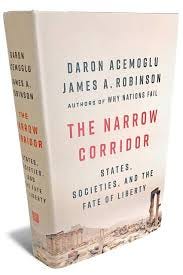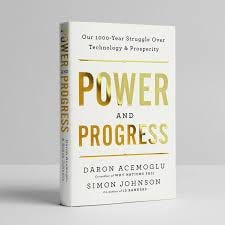Benedict XVI and the Nobel Prize in Economic Sciences
His Prescient Call to Take a Stand for the Common Good of Our Institutions
I have mentioned in previous posts the programmatic call of Pope Benedict XVI in the introductory section of his 2009 social encyclical Caritas in veritate: On Integral Human Development in Charity and Truth. The core of number 7, reads as follows (emphasis in the original):
To desire the common good and strive towards it is a requirement of justice and charity. To take a stand for the common good is on the one hand to be solicitous for, and on the other hand to avail oneself of, that complex of institutions that give structure to the life of society, juridically, civilly, politically and culturally, making it the pólis, or “city”. The more we strive to secure a common good corresponding to the real needs of our neighbours, the more effectively we love them. Every Christian is called to practise this charity, in a manner corresponding to his vocation and according to the degree of influence he wields in the pólis. This is the institutional path — we might also call it the political path — of charity, no less excellent and effective than the kind of charity which encounters the neighbour directly, outside the institutional mediation of the pólis. When animated by charity, commitment to the common good has greater worth than a merely secular and political stand would have.
At least two points merit comment. The first is that desiring and striving toward the common good is a requirement of the virtues of justice and charity. For St. Thomas Aquinas, general justice—understood as justice regarding the common good—is the highest of all the moral virtues, which is almost self-evident since the good of the many or the whole is better than the good of the individual. Charity is, of course, the highest virtue for the whole Christian tradition. Pope Benedict XVI is emphasizing, therefore, some of the most fundamental principles of Christian ethics. Though fundamental to being a Christian, this point needs to be emphasized for especially American Catholics because the individualism that dominates our culture leaves too many of us thinking that it is morally acceptable to disregard it and “look out for number 1.” The most fundamental principles of Christian ethics, however, require us to order all of our action consistent with the common good and the love of neighbor.
I would argue that the neglect of these fundamental principles of Christian morality helps to explain why the Universal Call to Holiness and the Apostolate of the Laity as articulated by the Second Vatican Council have born so little fruit.
The second important point concerns how such desiring and striving for the common good requires us to “take a stand” for it, by being solicitous for it, that is by showing attentive care or protectiveness for it. More specifically, Benedict wisely calls us to take this stand and be solicitous of the common good precisely as it exists in—and is served by—“that complex of institutions that give structure to the life of society, juridically, civilly, politically and culturally.” To reiterate, it is fundamental to moral uprightness that we care for our institutions, including the public ones.
Benedict was writing in 2009 just after the peak of the financial crisis that marked the end of the consensus for a neoliberal economic paradigm, which was characterized in especially the United States by an anti-institutional bias. This anti-institutionalism was encouraged by the famous line from Ronald Reagan’s 1981 Inaugural Address where he asserted “…government is not the solution to our problem; government is the problem.” This famous assertion marked the acceleration of an era in which especially conservatives—with whom I aligned for decades—denigrated and degraded our public institutions, building upon generations of propaganda that government participation in the economy was the road to socialism as I described in my previous post on “The Counterattack of The Big Myth.” Such propaganda was generously funded by the wealthy, who wanted to prevent the development of public institutions that could contest their domination of the political process and the economy. Benedict wisely encouraged the rebuilding of these institutions, which is the opposite of the populist “institutional pyromania” that has followed, which is largely funded by the same oligarchic interests for the same reasons.
A wide body of scholarship has been published in recent years that strongly supports Benedict’s emphasis on being solicitous for, and participating in, our institutions. Indeed, as I briefly noted in a prior post, the 2024 Nobel Prize in Economic Science has just been awarded to the three scholars most responsible for this work, namely Daron Acemoglu and Simon Johnson of the Massachusetts Institute of Technology and James A. Robinson of the University of Chicago.
The brief synopsis of their contribution follows.
This year’s laureates in the economic sciences – Daron Acemoglu, Simon Johnson and James Robinson – have demonstrated the importance of societal institutions for a country’s prosperity. Societies with a poor rule of law and institutions that exploit the population do not generate growth or change for the better. The laureates’ research helps us understand why.
I include below synopses of three of their primary books.
Why Nations Fail: The Origins of Power, Prosperity and Poverty (2012)
Brilliant and engagingly written, Why Nations Fail answers the question that has stumped the experts for centuries: Why are some nations rich and others poor, divided by wealth and poverty, health and sickness, food and famine?
Is it culture, the weather, geography? Perhaps ignorance of what the right policies are?
Simply, no. None of these factors is either definitive or destiny. Otherwise, how to explain why Botswana has become one of the fastest growing countries in the world, while other African nations, such as Zimbabwe, the Congo, and Sierra Leone, are mired in poverty and violence?
Daron Acemoglu and James Robinson conclusively show that it is man-made political and economic institutions that underlie economic success (or lack of it). Korea, to take just one of their fascinating examples, is a remarkably homogeneous nation, yet the people of North Korea are among the poorest on earth while their brothers and sisters in South Korea are among the richest. The south forged a society that created incentives, rewarded innovation, and allowed everyone to participate in economic opportunities. The economic success thus spurred was sustained because the government became accountable and responsive to citizens and the great mass of people. Sadly, the people of the north have endured decades of famine, political repression, and very different economic institutions - with no end in sight. The differences between the Koreas is due to the politics that created these completely different institutional trajectories.
Based on 15 years of original research Acemoglu and Robinson marshal extraordinary historical evidence from the Roman Empire, the Mayan city-states, medieval Venice, the Soviet Union, Latin America, England, Europe, the United States, and Africa to build a new theory of political economy with great relevance for the big questions of today, including:
China has built an authoritarian growth machine. Will it continue to grow at such high speed and overwhelm the West?
Are America’s best days behind it? Are we moving from a virtuous circle in which efforts by elites to aggrandize power are resisted to a vicious [circle] that enriches and empowers a small minority?
What is the most effective way to help move billions of people from the rut of poverty to prosperity? More philanthropy from the wealthy nations of the West? Or learning the hard-won lessons of Acemoglu and Robinson’s breakthrough ideas on the interplay between inclusive political and economic institutions?
Why Nations Fail will change the way you look at—and understand—the world.
If Acemoglu and Robinson “conclusively show that it is man-made political and economic institutions that underlie economic success,” what result should we expect from the contemporary populist inclination to tear down our public institutions, which allows the wealthy and powerful free reign?
The Narrow Corridor: States, Societies and the Fate of Liberty (2019)
From the authors of the international best seller, Why Nations Fail, a crucial new big-picture framework that answers the question of how liberty flourishes in some states but falls to authoritarianism or anarchy in others - and explains how it can continue to thrive despite new threats.
Liberty is hardly the "natural" order of things. In most places and at most times, the strong have dominated the weak and human freedom has been quashed by force or by customs and norms. Either states have been too weak to protect individuals from these threats or states have been too strong for people to protect themselves from despotism. Liberty emerges only when a delicate and precarious balance is struck between state and society.
There is a Western myth that political liberty is a durable construct, a steady state, arrived at by a process of "enlightenment". This static view is a fantasy, the authors argue; rather, the corridor to liberty is narrow and stays open only via a fundamental and incessant struggle between state and society. The power of state institutions and the elites that control them has never gone uncontested in a free society. In fact, the capacity to contest them is the definition of liberty. State institutions have to evolve continuously as the nature of conflicts and needs of society change, and thus society's ability to keep state and rulers accountable must intensify in tandem with the capabilities of the state. This struggle between state and society becomes self-reinforcing, inducing both to develop a richer array of capacities just to keep moving forward along the corridor. Yet this struggle also underscores the fragile nature of liberty. It is built on a fragile balance between state and society, between economic, political, and social elites and citizens, between institutions and norms. One side of the balance gets too strong, and, as has often happened in history, liberty begins to wane. Liberty depends on the vigilant mobilization of society. But it also needs state institutions to continuously reinvent themselves in order to meet new economic and social challenges that can close off the corridor to liberty.
Today we are in the midst of a time of wrenching destabilization. We need liberty more than ever, and yet the corridor to liberty is becoming narrower and more treacherous. The danger on the horizon is not "just" the loss of our political freedom, however grim that is in itself; it is also the disintegration of the prosperity and safety that critically depend on liberty. The opposite of the corridor of liberty is the road to ruin.
Acemoglu and Robinson show that the liberty we take for granted “is not the natural order of things,” that it depends on a struggle to maintain a fragile balance, and that the opposite of the narrow corridor of liberty is the road to ruin. If this is true, how does this relate to the political choices confronting contemporary Catholics? In other words, what socio-economic result should we expect from following the postliberal integralists by aligning with populism and autocracy? The work of Acemoglu and Robinson would seem to show that this choice is the road to ruin. On the other hand, the participationist path of social Catholicism—as I have illustrated in in previous posts—engages us precisely the political struggle to maintain the fragile balance that is the road to liberty.
Power and Progress (2023)
Awarded the 2024 Nobel Prize in Economics, Daron Acemoglu and Simon Johnson overturn conventional wisdom about how economies work--revealing the untold story of who wins and who loses the rewards of prosperity--in a work that fundamentally transforms how we look at and understand the world.
Throughout history, technological change — whether it takes the form of agricultural improvements in the Middle Ages, the Industrial Revolution, or today’s artificial intelligence — has been viewed as a main driver of prosperity, working in the public interest. The reality, though, is that technology is shaped by what powerful people want and believe, generating riches, social respect, cultural prominence, and further political voice for those already powerful. For most of the rest of us, there is the illusion of progress.
Daron Acemoglu and Simon Johnson debunk modern techno-optimism through a dazzling, original account of how technological choices have changed the course of history. …
To achieve the true potential of innovation, we need to ensure technology is creating new jobs and opportunities rather than marginalizing most people, through automated work and political passivity. We need to use the tremendous digital advances of the last half century to create useful and empowering tools, and seize back control from a small elite of hubristic, messianic tech leaders pursuing
their own interests.
With their breakthrough economic theory and manifesto for building a better society, Acemoglu and Johnson provide the understanding and vision to reimagine and reshape the path of technology and create true shared prosperity.
Conclusions for Aspiring Social Catholics
With American Catholic socio-political engagement narrowed to culture war issues like abortion for decades, we have had far too little awareness of the solicitude for the common good and for our public institutions that are fundamental to Christian ethics and to living the truth of the Gospel in the modern world. To the extent that we have fallen short, we have failed to realize our high calling to holiness in Christ, to live out our lay apostolates in the world, and to thereby manifest the Church as the efficacious sign and instrument of unity that the Fathers of the Second Vatican Council primarily proclaimed her to be in the programmatic no. 1 of Lumen gentium: Dogmatic Constitution on the Church, in fidelity to Scripture and Tradition, as understood through the discernment of the magisterium.1
While it is far too early to tell the extent to which Catholics will eventually take the opportunity to respond to “the signs of the times” to foster a new social Catholicism for the 21st Century and a better kind of politics as I have been arguing in the substack, the upcoming election offers us an early test case. It offers us a chance to reconsider what Drew Christiansen, SJ describes as “the institutional principle” of Catholic Social Doctrine, especially in light of how it has been vindicated by the Nobel Prize winning work of Acemoglu, Robinson and Johnson. At a time when our constitutional democracy—and with it, the postwar liberal international order—are on the ballot, Catholics have an opportunity to decide whether they will “take a stand for the common good” of our institutions with Benedict or choose what these distinguished economists describe as a well-trodden “road to ruin.”
“Since the Church is in Christ like a sacrament or as a sign and instrument both of a very closely knit union with God and of the unity of the whole human race, [the Council] desires now to unfold more fully to the faithful of the Church and to the whole world its own inner nature and universal mission.”








